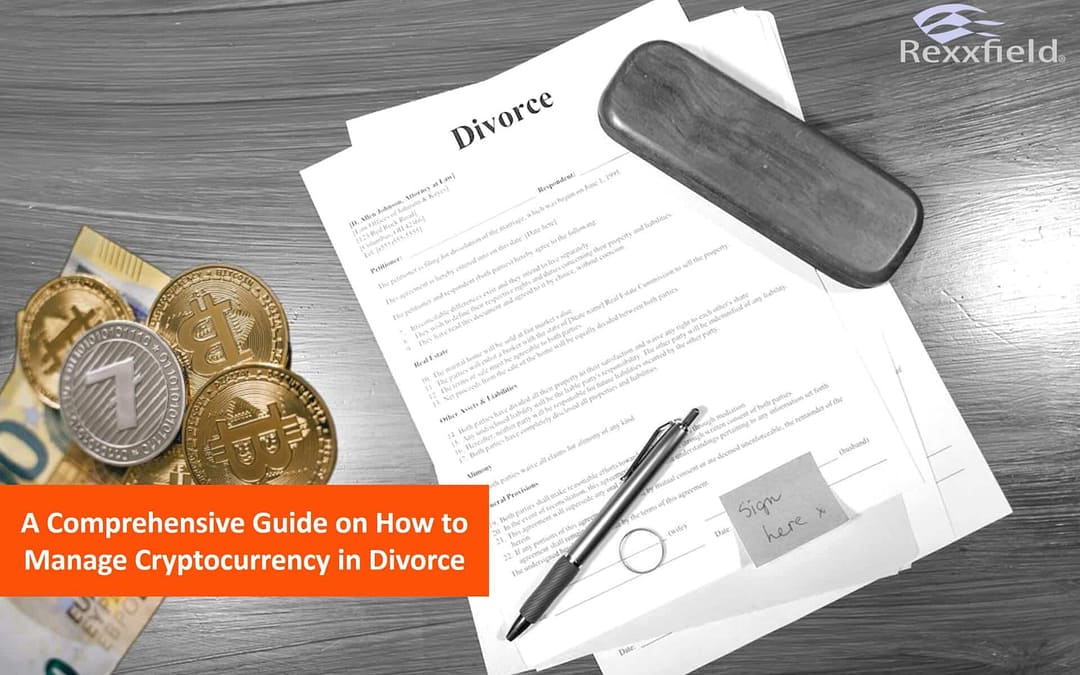Uncovering Cryptocurrency in Divorce Proceedings: A Comprehensive Guide
Introduction
Cryptocurrency has become an increasingly common asset in divorce proceedings, and it’s important to uncover any hidden crypto to ensure you get a fair settlement. In this guide, we’ll provide a comprehensive overview of cryptocurrency in divorce cases, signs that your spouse may be hiding assets, who you should hire instead of or in conjunction with a crypto divorce lawyer, steps to take if you suspect your spouse is hiding cryptocurrency, and the importance of asking your divorce lawyer to hire a blockchain forensics investigator.
We will round off with a real case study on how Mrs Smith gained an extra $63,000 just by asking her divorce lawyer to get specialized help uncovering her husband’s lies about their cryptocurrency holdings.
Section 1: Understanding Cryptocurrency in Divorce Proceedings
Cryptocurrency is a digital asset that uses encryption techniques to secure its transactions and control the creation of new units. The most amazing thing about cryptocurrency is that every transaction is stored on a public ledger (“the blockchain”) for anyone with the transaction ID to view. This is super important because it is the characteristic that allows a blockchain forensics specialist to trace transactions that may be hiding your wealth.
It’s vitally important to consider cryptocurrency in divorce proceedings because cryptocurrency can have a surprisingly high value now, and perhaps a lot more in the future. To the uninitiated, cryptocurrency can be easily hidden and difficult to trace, especially to a divorce lawyer or accountant who aren’t trained or experienced in the art of tracing cryptocurrency. But to specialists who trace it day in and day out, it is surprisingly easy.
And just in case you were dismissing this as a problem in your divorce proceedings, according to a survey by the American Academy of Matrimonial Lawyers, 93% of divorce lawyers reported an increase in cryptocurrency being used to hide assets.
Section 2: Signs Your Spouse May Be Hiding Cryptocurrency Assets
How do you know if your spouse is telling the truth about your and their crypto assets?
Some common signs that your spouse may be hiding cryptocurrency assets include:
- Unusual activity in bank accounts or credit cards,
- Transfers to unknown or offshore accounts,
- Changes in behavior, such as secrecy or defensiveness about finances,
- Unexplained withdrawals or deposits,
- Unfamiliar cryptocurrency accounts or wallets,
- You’ve found a list of 12 or 24 random words written down somewhere, perhaps that your spouse didn’t expect you to find,
- You discover a USB-like memory stick that is larger than a normal USB stick,
- You notice unusual apps (you don’t recognised) on their phone or computer,
- They are in cryptocurrency-themed chats on Telegram, WhatsApp, Signal, Discord or Facebook,
- They have talked about cryptocurrency, but they either deny they have any, say it has gone to zero, been stolen or they are very evasive when ask about it.
If you are aware of or share cryptocurrency accounts, you should also be suspicious about any unexplained transactions, such as sudden increases in value or transfers to unknown accounts or into tokens or coins you do not recognize.
Section 3: Steps to Take if You Suspect Your Spouse is Hiding Cryptocurrency Assets
If you suspect your spouse is hiding cryptocurrency assets, there are steps you can take:
- Document all evidence of suspicious activity, including screenshots of cryptocurrency accounts and bank statements,
- Gather any wallet addresses or transaction hash data you can, as well as dates transactions were made,
- Hire a divorce lawyer who is not too proud to ask for help to verify cryptocurrency assets, movement and value, Some will try and do this in-house, but it is you who lose if they make an error or miss some. Insist that they hire an expert digital asset forensic investigator (like Rexxfield),
- Request your lawyer submit a subpoena for cryptocurrency records from exchanges or wallets where your spouse may have accounts. If they don’t know how, ask your lawyer to ask the digital asset forensic investigator to ghost-write it for them,
- Report any suspicious activity to law enforcement or regulatory agencies,
- If you suspect your lawyer is reluctant to hire an expert, consider hiring a blockchain forensics investigator yourself to provide a third party to trace cryptocurrency transactions and uncover any hidden assets.
Follow each of the above steps and you will be well placed to make sure you get your fair share of cryptocurrency in your crypto currency divorce proceedings.
Section 4: Hire a Blockchain Forensics Investigator: Why You Need One
A lawyer should be good at knowing and protecting your rights, but their bread and butter job is not digital and blockchain forensics. Just as you wouldn’t hire your vet to remove your appendix, you shouldn’t rely on a lawyer to verify your cryptocurrency holdings. They may have some idea where to look, but they just don’t have the experience, expensive tools and certified skills to undertake a blockchain trace without you being left wondering if they got it all. (As someone who has had a burst appendix, I’d very glad my vet wasn’t the surgeon!)
A blockchain forensics investigator specializes in tracking cryptocurrency transactions and can therefore provide valuable evidence to support your financial rights in divorce proceedings. They have industry trained and certified blockchain tracing specialist who can trace transactions, even through methods use to hide the transaction, can identify hidden assets, and provide expert testimony in court. Working with a reputable firm like Rexxfield can ensure that you have the best possible chance of uncovering any hidden cryptocurrency assets.
Section 5: Case Study – How Rexxfield Uncovered 500k GBP in hidden cryptocurrency assets in British Cryptocurrency Divorce Proceedings
Well that’s all well and good, but how does this look in practice?
I’m going to step through an actual case we solved in early 2023. All names, numbers and some details have been changed to protect the client and Rexxfield.
Part 1: The problem
We were contacted by a law firm who was representing a woman who was divorcing her husband. Let’s call them Mr & Mrs Smith (not their real name).
The brief said that the husband had purchased crypto currency and he had told a story that downplayed it’s value and his holdings. His story was a mixture of excuses why the cryptocurrency was not worth very much in the calculation of the marital and household assets. Some of the excuses were:
- He’s lost some of the keys, so couldn’t access the cryptocurrency,
- He’d been hacked, and no longer had access to some of the cryptocurrency, and
- Other crypto he had purchased had decreased 80% in value and so was not worth very much today.
The brief to Rexxfield was to:
- Try and determine how much had been spent on cryptocurrency between given dates,
- Assess and verify the types and value of cryptocurrency holdings,
- Determine if there was evidence for or against a hack, theft or scam stealing some of the cryptocurrency,
- Is there evidence for or against the assertion that private keys to certain wallets had been lost,
- What was the value of all of the cryptocurrency today, that was still believed to be in possession of Mr Smith?
Part 2: Gathering Data.
In a case like this, Mr Jones had to provide all the wallet addresses he had or was in control of. It was possible that he could have been withholding wallet addresses, but with Rexxfield’s expertise, we can usually find wallet addresses not disclosed and then proceed to work with Mr’s Smith’s lawyers to determine if any belonged to Mr Smith.
For example, we could see what transactions had been made from his bank account to the centralized exchange he used, and from there we could follow the trail and look at the transactions in and out to have a pretty good idea which wallets were his and which belonged to others. In this case, if Mr Smith did withhold wallet addresses, he may have been in contempt of court, and his position would have looked much worse before the judge.
So we had all the wallet addresses and we also got possession of most of the initial transaction ID’s (TXiDs).
Part 3: Analysis
This case had an initial hurdle for us to jump, in that some of the transaction IDs appeared to be invalid. But one of our brilliant investigators discovered they were transaction IDs for an old, obscure blockchain that isn’t used anymore. Once we had cracked that nut, we were off and running.
I’m not going to bore you with the details, but we dug through the rabbit warren of transaction, blockchains, tokens and (shit)coins to piece together a picture for Mrs Smith and her lawyers of what had happened.
Part 4: The Result.
We were able to conclude beyond reasonable doubt that Mr Smith had lied about being hacked. The flow of crypto had none of the characteristics of a hack (draining of wallet, large number of transactions into consolidation wallets and so on).
We were not able to conclude for certain that Mr Smith still had the keys, but we did find a transaction after he said the keys had been lost, which indicated that either he was lying or perhaps wrong about the timing of the loss.
Overall we were able to conclude that out of the approximate $550k in crypto Mr Smith had purchased, around $125k still remained in his control (value at the date of our analysis).
Therefore, we were able to increase Mrs Smith’s share of the martial assets by approximately $63,000.
Not bad, considering our expert analysis cost Mrs Smith less than ¼ of what she was able to gain from our work unpacking Mr Smith’s lies.
Conclusion
If your marriage is heading towards an end, then cryptocurrency in divorce should be given your full attention. Do not ignore it. Is an important asset to consider in divorce proceedings because it can be worth a substantial amount of money now, and in the future. It’s essential to uncover any hidden assets to ensure a fair settlement for yourself, and for those who depend on you.
If you suspect your spouse is hiding cryptocurrency assets, take action by documenting evidence, hiring a digital forensics investigator (either through a standard lawyer or crypto divorce lawyer, or hire us directly), and tell your divorce lawyer about Rexxfield. Our blockchain tracing investigators are experts, tracing cryptocurrency transactions on a daily basis. We can find what has been hidden, even across obscure blockchains and through mixers. With the right help, you can ensure that you receive a fair settlement so you can move on with your life.
You can reach out in full confidentiality to Rexxfield to find out about how we can make sure you get fair treatment in any crypto currency in divorce proceedings. Forensics ‘at’ rexxfield.com.


